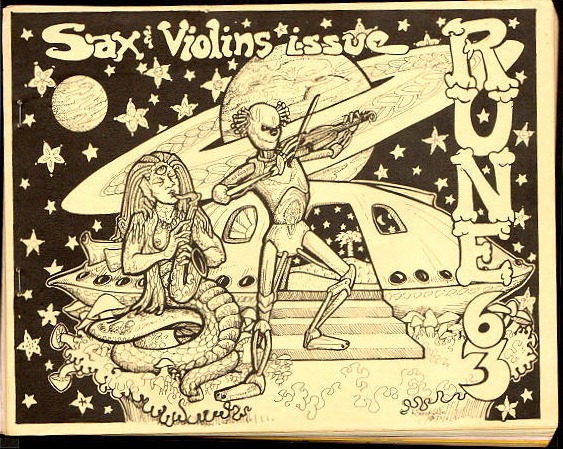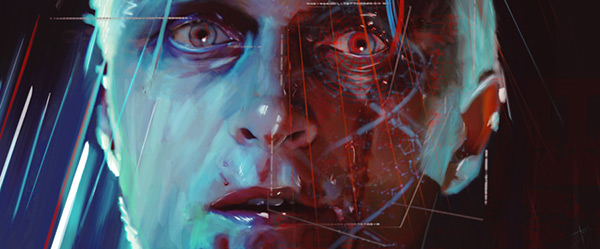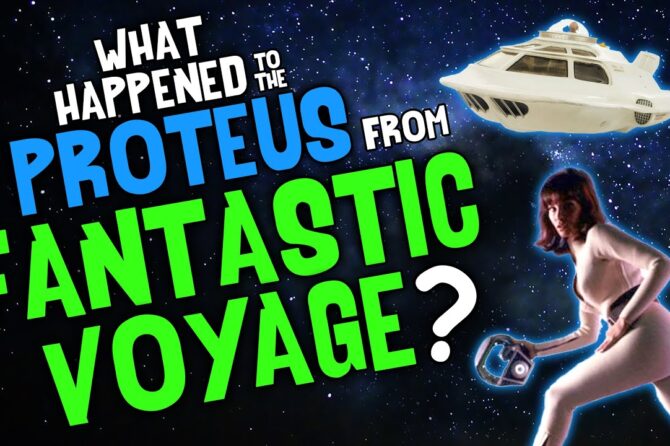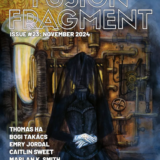I have been producing fanzines off and on since 1976, shortly after encountering science fiction fandom and this particular aspect of that hobby interest. As anybody who has ever pubbed (that is fanspeak for “published”) an ish (“issue”), the life-blood of fanzines is the letter of comment (here’s another fanspeak term: loc, or LoC, depending on personal preference). As fanzines over the course of the last few years have shifted more and more into electronic forms, an interesting trend has developed, and it concerns the tradition of loccing: writing letters of comment to fanzines received in the mail.
This is a long-held, and treasured, tradition of fanzine fandom. The letter column of a fanzine is usually where most of the “action” occurs as fans natter back and forth, commenting on articles and artwork that appear in that fanzine, eventually even commenting on letters appearing in the previous issue as well. In this way the grand communication network of science fiction fanzines began back in the 1930s, and continues to this day.
 Before I began pubbing my own ish in 1976 – a sort-of clubzine called This House – I was writing locs to fanzines such as Rune, the clubzine of the Minnesota Science Fiction Society, Inc., and Terry Hughes’ Mota., plus others. It was really neat to not only see my own name in print, but other fans wrote locs about my locs, then I started getting even more fanzines in the mail. That kind of egoboo (fanspeak for “ego boost”) gave me the oomph to start up This House. The cool thing about doing that meant I started getting locs sent to me about MY fanzine, and other faneditors sent their fanzines in trade, so I sent mine to them, and….
Before I began pubbing my own ish in 1976 – a sort-of clubzine called This House – I was writing locs to fanzines such as Rune, the clubzine of the Minnesota Science Fiction Society, Inc., and Terry Hughes’ Mota., plus others. It was really neat to not only see my own name in print, but other fans wrote locs about my locs, then I started getting even more fanzines in the mail. That kind of egoboo (fanspeak for “ego boost”) gave me the oomph to start up This House. The cool thing about doing that meant I started getting locs sent to me about MY fanzine, and other faneditors sent their fanzines in trade, so I sent mine to them, and….
So it went. That cycle is the great conversation of fandom that still babbles on. The problem here in the not-so-early 21st century is that more and more fanzines are produced online, and these e-zines, as they are called (electronic fanzines), usually receive fewer letters of comment than paper fanzines receive. As someone who once produced paper fanzines for 13 years (1976-1989) and e-zines for 10 years now (since 2003), I do notice the difference. This discrepancy has been a discussion topic in fanzines now for a few years. In fact, many fans reading this can spot this trend very easily, provided you get paper zines like Challenger, Alexiad, Banana Wings, Trap Door, Chunga, and Reluctant Famulus in the mail. Compare their lettercolumns to those of the purely electronic fanzines Drink Tank, Exhibition Hall, Revenant, and my own Askance. There is a distinct difference in the number of letters published between the paper zines and the e-zines.
Some theories have been expounded as to why this is. The most common idea is that since e-zines are essentially free to view at the website efanzines.com, readers don’t feel as compelled to write a letter as they do when they get a physical fanzine – the dead tree zines – in the mail. That makes sense to me. What worries electronic faneditors of today is that they have no idea if people are really *reading* their zines or not. The concern is that if an e-zine gets no response, then the grand conversation of fanzines begun back in the early 1930s may come to an inglorious end. And that would truly be sad.
Then again, as communication technology changes, so does fanac in all of its forms. Blogs, listservs, social media, and so on, are all contemporary forms of of the conversation of fandom. So we are still talking to each other; it is only that the means of communicating are different than before.
The more things change…











I definitely think the conversation has moved online, particularly to Facebook and social media. I suspect that part of the decline in response to fanzines is linked with the decline of all kinds of media — too much competition for people's attention and the decreasing attention spans of the internet age. After all, if you're writing and participating here, that gives you less time to read and participate elsewhere.
However, the last full-size fanzine I sent out by mail, in 2000 after a bit of a hiatus, drew a disappointing number of locs, and mainly short ones, compared to earlier issues of the zine. So maybe a return to paper zines would not suffice.
I do miss the handcrafted element of fanzines, both as a creator and as a consumer, but that pretty much faded when photocopies replaced mimeography.. When zines were produced by mimeo or ditto or letterpress, hands-on processes, each had its own distinctive look. Photocopies and webzines don't have so much diversity. I mean when you got Energumen in the mail, with its blue pages and pristine mimeography or Sticky Quarters with its square typeface and sometimes barely legible repro, you didn't have to look at the return address to know who it was from.
Maybe the Bill Bowers scheme might be the answer. Bill wanted to know just who was reading his zines, even after he went electronic, so although he posted them to e-fanzines, he added a password. One thing that kept people loccing and contributing was the idea that you might be cut off the mailing list if you didn't. Maybe you could elicit more comments by changing the password each issue, and only giving the new password to people who send in the no-longer-usual.
Before I forget, the person responsible for the wonderful RUNE #63 cover reproduced in the blog posting is Laramie Sasseville, a long-time Minn-stf member. Note to self: ask her for a future cover for ASKANCE.
Thank you for sharing your thoughts, Sue (can I call you that?), and I agree with nearly everything you said. I am still an active fanzine loc-writer, and when I do I try to cover as much of the zine's contents as I can. Now, sometimes the fanzine is so large – like Guy H. Lillian III's CHALLENGER, which tops out around 100 pages each issue – that writing a comprehensive loc results in a major article by itself. That is when I get selective about what I comment upon.
Your closing thoughts are dead-on, too. One thing I have done to alleviate the feeling of "am I wasting my time on this?" with a fanzine, I had Bill Burns, the efanzines.com guru, put a site counter on my fanzines hosted there. When I check that once in a while, it tells me how many visits my zine has had and how long someone has spent on that issue. Some people do write locs – Lloyd Penney and Eric Mayer are the most reliable at this – when they read the zine online, but I do print off "some" copies for mailing. In fact, that is a practice that results in more locs and zines in trade. Bottom line is that I need to balance out the e-zine with a hard copy, which is what is done with CHUNGA, TRAP DOOR, RELAPSE, and some other fanzines: the print copy gets mailed first, then a month later that issue is posted to http://www.efanzines.com. That seems to result in a fair amount of response. I must do this as well.
Of course you're welcome to call me Sue.
I discovered fanzines back around 1986 while raiding a comic book store for anything Star Wars related, and the owner handed me a flier advertising various ones for sale. I was a contributing author to many different series for years and it was such a thrill not only to see my name in print and know I wasn't alone in my obsession, but the biggest kick of all was to see my stories illustrated! That's another thing I miss about the demise of print zines. You almost never see an online story illustrated anymore.
What motivated me to finally edit and produce my own zines was a growing frustration in paying upwards of $30 for a zine, only to find maybe 1 or 2 stories in it that really spoke to me as a Han/Leia shipper. Multi- and slash-zines meant even worse odds for finding something I really liked. So a friend and I decided to do it ourselves and jump into the ring. We called/wrote to every fanzine editor we could and picked their brains, then started putting out the call for submissions to the first and only all Han/Leia zine. We got enough quality material within months that the first issue clocked in at just over 200 pages and we sold out the first run of 150 copies within a year. The second issue was over 375 pages (huge!) and again sold 150 copies within the first year. They were huge successes and to this day I still get compliments on the quality, and just this past week I got an email from someone asking if still had any copies for sale. I'm going to have to hit a print shop to make a few more. 🙂 You can see most of the content here: http://www.useakiss.com.
Sadly, real life and finances forced me to cancel the third issue. I do sometimes still get the urge to produce another one, but I fear there just isn't enough new quality material being produced anymore, or enough audience willing to pay money for an issue, to support the sort of product I make. Rather than doing a full zine again, I may just create a compilation of my own stories and sell it as a stand-alone. Assuming I have that kind of time and energy again.
I agree: producing a fanzine of any size takes time and energy. I had no idea the zine you folks put out was of such Brobdingnagian proportions (I love it when I can use that word in a sentence). Thank you for the link, too. I enjoy checking out other people's fanzines.
As for that "urge to produce" a zine again, I know how you feel. It doesn't have to be the same large-scale project. You could pub what's called an "ensmalled" fanzine: no longer than 10 pages that, when folded properly, will fit in a letter-sized envelope and you can mail out first class. I've started up another one of those this week, called Askew. They take very little time to produce and you can post them either online or send out in regular mail.
Speaking as an editor of "dead tree zines" (I produced two Star Wars-focused issues between 1999 and 2000), I completely agree with the opinion shared here, but I'd like to add to it. One of the biggest complaints I've heard from writers as well as from editors is the increasing lack of feedback from readers since most fandom migrated online. Back in the day, I wrote quite a few of my own LoCs to various fanzines, and in general you made an effort to comment on EVERY piece within the zine in question, even the stories you weren't particularly fond of. You also tended to be more thoughtful of the kind of feedback you gave. I think it's because in the back of your mind you knew that your letter would appear in print in the next issue. Online this sort of feedback is almost nonexistent now–at best you may get the occasional "I really love this!" from a random and often anonymous reader, but most of the time there's just dead silence. The times you get a comment that consists of more than a sentence or two are so rare that they're notable. Considering the fact that none of us makes money for the countless hours spent slaving over a story or zine, in the past you at least got some satisfaction in knowing your audience was reading and enjoying your efforts. Now it feels more like you're just wasting your time, and this is a very sad thing. Sometimes change isn't for the best. 🙁